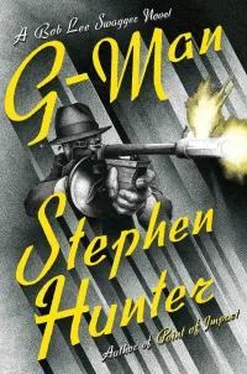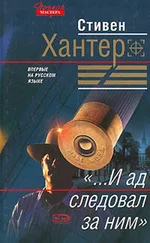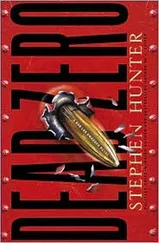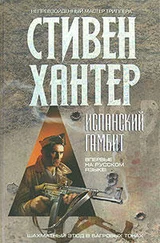Стивен Хантер - G-Man
Здесь есть возможность читать онлайн «Стивен Хантер - G-Man» весь текст электронной книги совершенно бесплатно (целиком полную версию без сокращений). В некоторых случаях можно слушать аудио, скачать через торрент в формате fb2 и присутствует краткое содержание. Жанр: Старинная литература, на английском языке. Описание произведения, (предисловие) а так же отзывы посетителей доступны на портале библиотеки ЛибКат.
- Название:G-Man
- Автор:
- Жанр:
- Год:неизвестен
- ISBN:нет данных
- Рейтинг книги:3 / 5. Голосов: 1
-
Избранное:Добавить в избранное
- Отзывы:
-
Ваша оценка:
- 60
- 1
- 2
- 3
- 4
- 5
G-Man: краткое содержание, описание и аннотация
Предлагаем к чтению аннотацию, описание, краткое содержание или предисловие (зависит от того, что написал сам автор книги «G-Man»). Если вы не нашли необходимую информацию о книге — напишите в комментариях, мы постараемся отыскать её.
G-Man — читать онлайн бесплатно полную книгу (весь текст) целиком
Ниже представлен текст книги, разбитый по страницам. Система сохранения места последней прочитанной страницы, позволяет с удобством читать онлайн бесплатно книгу «G-Man», без необходимости каждый раз заново искать на чём Вы остановились. Поставьте закладку, и сможете в любой момент перейти на страницу, на которой закончили чтение.
Интервал:
Закладка:
“But you do have her name.”
“The newspaper gives her name as a Mary Sue Bridgewater.”
“There’s your lead,” Jen said.
So the next morning he called Jake Vincent in Little Rock, asked Jake to recommend a good private detective, got an outfit the firm had worked with many times, and via Jake soon found himself talking with an investigator, and he laid the specifics before him.
“It is a long shot, Mr. Swagger,” said the professional detective. “But we have document specialists who will go through census records, tax records, newspaper obits, property deeds, anything on paper, and if ninety-four-year-old Mary Sue Bridgewater is still breathing somewhere in the continental U.S., we’ll find her for you.”
“Thank you, I appreciate it.”
But that left him with but one task that he could do himself and it was as foolish a fool’s errand as any fool had ever thought up.
He had the Xerox of the strange “map” from the strongbox, where the badge, the gun cylinder — or was it from a car, an airplane, a refrigerator, a locomotive, or a popcorn popper? — the Colt pistol, and the thousand-dollar bill had been found. It was an aerial scheme of what appeared to be a wall, presumably some structure’s external wall. It sported two window wells, or that’s what he assumed the indentations in the wall had to be, and from the second one, on a northeastern angle — again assuming the map was oriented with north at the top — ten dashes stood for ten steps to a circle, which Bob assumed was a tree, and on the other side of the trunk were three more dashes leading to an X. X marks the spot. X the unknown. The X factor. Mr. X. X!
Bob realized it could be no dwelling on the Swagger property, because at no place in the house he grew up in, and Earl before him, and even Charles before that, had there ever been two windows as close together as these seemed to be, assuming they were windows, assuming this was a map and not a doodle, assuming this, assuming that.
It’s so thin, he thought. Everything about this old bastard was thin. He sure as hell didn’t want anybody poking into his business, and he’d either left no tracks or carefully erased his own.
At any rate, Swagger’s solution to this problem was short on insight, long on labor. Out of the same Historical Society, he’d come up with a telephone directory, fortunately quite brief. He guessed that his grandfather’s acquaintance circle would have mostly been prominent civic types. He was “The Sheriff,” after all. So Swagger found the town municipal guide, wrote down the names of all of 1934’s county officials — there were twenty-one — and then looked them up in the phone directory, yielding twenty-one 1934 addresses, most in what had been the “quality” section of town in those days. Then he added doctors and lawyers. So after much listing and recording, he finished up with thirty-nine addresses.
Thus, he spent the next two days visiting each one, peering from afar, as he compared windows and wall variations and tree occurrences with the map, and if he noted a possibility, he knocked, introduced himself, and was allowed to circle the house perimeter — assuming the house had been built before 1934—and of the thirty-nine addresses, thirty-three remained, him searching for that magical arrangement of windows and a single tree, along a wall that itself was oriented to the north.
The result: nothing.
Nights, he went through old Vincent family scrapbooks, just hoping, but the result was the same. The Vincents knew other old Blue Eye families, and he had access to a batch of other albums, and were he writing a book on the agrarian aristocracy of Polk County in the ’30s, he’d have been all set, for he saw lots of men in three-piece suits, ties tight, with fedoras low, at backyard parties with women in tea dresses of flowery, flimsy material, all of them prosperous and well pleased with their place in time and society. But of the man-killing sheriff and war hero, not a thing. Had the sheriff exiled himself or did he prefer people lower in the order, or, even more likely, he preferred nobody, nothing. He was a loner on his family farm, working his guns, doing his hunting, and maybe as an alpha he had some low-grade gofers around happy to do his bidding in exchange for the presence of the genuinely heroic. But if this even happened, it left no record.
At the end of his two days of labor in Blue Eye, he had learned exactly nothing.
CHAPTER 19
CHICAGO
July 16, 1934
When he finally left the hospital, Charles drove straight downtown, arriving at the office at 7 a.m. He went up to nineteen and sat down at his typewriter and clacked out a bare-bones report of last night’s incident over two carbons, including the info that he’d prevailed on the State cops to keep his name out of the papers, then put the original on Sam’s desk, the first carbon on Purvis’s, and the third on Hugh Clegg’s.
Then he went downstairs, went to the nearest Toddle House, and had himself a breakfast of eggs and bacon. And a pot of coffee. He figured it was better to work straight through the day than to go home, nap, and come in by 2 p.m.
When he got in, he went straight to his desk. His schedule was to work through a pile of reported “sightings” of the bad boys, most of which could be checked out by phone. If he was dissatisfied with that conversation, he’d put in for a car and put it on his list of face-to-face interviews. Then at 1 there was a meeting of the Dillinger Squad with the Gang Intelligence Squad — the police’s Dillinger Squad — at Central, to share information and coordinate strategy, though Charles thought it was mostly silliness and fantasy. From 4 to 5, he was to be at that same installation’s firing range, where he was going to run three newly arrived agents through his course of fire, evaluate them, see who had the gift and who’d best be kept behind the lines. Looking at the files, he saw one had served in the Michigan State Police for seven years, and he assumed that fellow would already know a thing or two.
But of course the incident of the night before had to be processed, and who knew how long that would take, so the schedule was pretty much up in the air. He worked steadily through the morning at his desk, on the phone, and at around 11 a call came; it was Purvis’s secretary, Mrs. Donovan, saying that Mel would like to see him. He rose and walked through the office, which was suddenly uncannily silent. When he got to the hallway that led to the offices, he turned, curious, and saw every agent in the place staring at him. And then they stood. And then they clapped.
“Swell, Charles,” said Purvis a few seconds later in his office. “As you can see, word has gotten around. Cops talk to other cops, and some of those other cops even talk to us.”
“Yes sir,” said Charles. He sat at a table across from Purvis and Clegg. Sam sat off a little, not exactly at the table, content not to face him or dominate the chat.
“You are to be congratulated,” said Purvis. “I had a call from the State Police Superintendent by seven a.m., and he told me one of my agents had saved two of his officers’ lives, and had shot it out with at least four or five heavily armed men — men with automatic guns, in fact — and had driven them away. That makes you an official hero, and, as you know, we haven’t had many heroes around here lately.”
“Thank you, Mr. Purvis.”
“We’ve all read the report by now,” said Clegg, who technically had no authority over Charles but whom Purvis had included almost as an invitation to take a swing at him and see if he could land one, as Clegg was not in the Purvis camp and therefore not in the Swagger camp. “But perhaps you’d take us through it orally.”
Читать дальшеИнтервал:
Закладка:
Похожие книги на «G-Man»
Представляем Вашему вниманию похожие книги на «G-Man» списком для выбора. Мы отобрали схожую по названию и смыслу литературу в надежде предоставить читателям больше вариантов отыскать новые, интересные, ещё непрочитанные произведения.
Обсуждение, отзывы о книге «G-Man» и просто собственные мнения читателей. Оставьте ваши комментарии, напишите, что Вы думаете о произведении, его смысле или главных героях. Укажите что конкретно понравилось, а что нет, и почему Вы так считаете.












